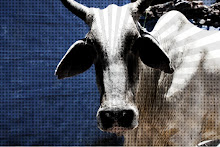
I googled 'running backwards' to see if anyone else was this nuts. It turns out backwards running is a more than a sport - it is a social movement. Here is a sample -
"The emergence of backward running is not a matter of chance, it is both a sign and the symbol that something “in the air” is becoming reversed. This new way of running announces the beginning of a new civilization. To reverse the most basic and common act of man, walking or running, is tantamount to touching his essence. What could be more effective than this simple exercise which will modify our view of everything? It can change our human relationships, our relationship to money, our conception of time, and at the social level can alter the face of our cities, our transportation and exchange systems, etc. At a time when an unprecedented human mutation is taking place before our very eyes, if practised as an exercise conducive to a change in our perceptions, the advent of backward running can bring down the certainties that underlie the general escapist movement. More than words can, a backward motion of our bodies will provoke a fundamental questioning of our commonest attitudes and bring about the social change that the urgency and gravity of the problems of our day require."
Well how about that! I guess that makes me, a forward runner, part of the embedded 'escapist movement.'
And then I discovered this... an awesomely amateur video demonstration of Delhi's running backwards man, Puran Chand, with a few interview fragments. He says he is training for the Commonwealth Games. The interviewer points out running backwards is not part of the Commonwealth Games. Chand replies that he hopes to provide a demonstration of backwards running in the main stadium. Book your seats for that one folks - or just go visit him on Shantipath.













